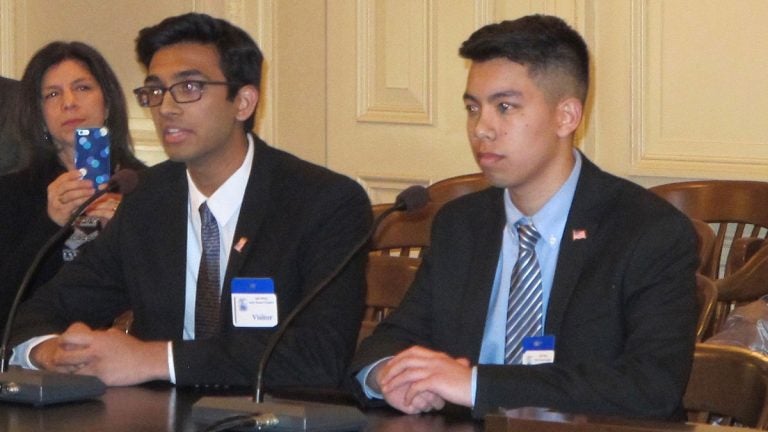New Jersey considers letting some 17-year-olds vote in primary elections
The New Voter Empowerment Act would allow 17-year-olds to vote in a primary election if they would turn 18 by the general election.

High school students Varun Seetamraju and Jason Lam tell lawmakers the legislation would empower thousands of first-time voters to participate in primary elections. (Phil Gregory/WHYY)
More young people in New Jersey might be able to vote in primary elections if a bill advancing in the Legislature becomes law.
What’s called the New Voter Empowerment Act would allow 17-year-olds to vote in a primary election if they would be18 by the general election.
That change would allow thousands of first-time voters to have a say in the outcome of primary election races, said Varun Seetamraju, a high school student in Basking Ridge.
“Nowadays, a lot of primaries are hotly contested, and every vote matters. But it also matters to how these candidates know what our issues are and what our beliefs are,” he said Thursday. “The issue is, if we can’t vote, a lot of times they don’t take us seriously.”
Jason Lam, a high school student in Bridgewater, joined Seetamraju in speaking during the legislative hearing.
He said the first time you vote is probably going to be the most exciting.
“If students are not allowed to vote in a primary and only allowed to vote in a general, then they’re really just voting for a party,” he said. “They’re not voting for a candidate who they could have backed within the primary. So we think that if we can get students excited about finding a candidate they want to back in the primary and going all the way to the general election, it’s much more likely that they’ll be voting when they’re 20, 30, 40 and so on.”
The League of Women Voters of New Jersey supports the legislation.
If the bill is enacted, the change in the law would not take effect until 2019.
WHYY is your source for fact-based, in-depth journalism and information. As a nonprofit organization, we rely on financial support from readers like you. Please give today.




